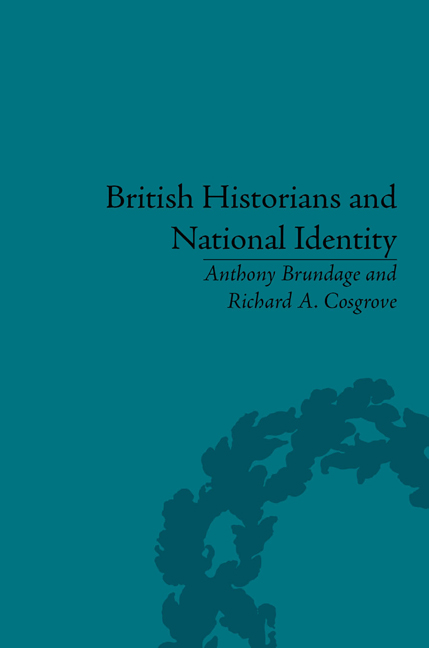Book contents
- Frontmatter
- CONTENTS
- Dedication
- Acknowledgements
- Introduction
- 1 Demythologizing the Nation's Past: David Hume's History of England
- 2 Catharine Macaulay's Vindication of Radicalism and the Republican Tradition
- 3 Reassessing Religion and the National Narrative: John Lingard and the English Reformation
- 4 Placing the Constitution at the Heart of National Identity: Henry Hallam and Constitutional History
- 5 Thomas Babington Macaulay: Writing the History of a Progressive People
- 6 The Glories of the Reformation and the Origins of Empire: J. A. Froude's Celebration of the Tudor Era
- 7 Edward Augustus Freeman: Liberal Democracy and National Identity
- 8 William Stubbs: The Continuity of English History as National Identity
- 9 Celebrating the People: J. R. Green's Short History
- 10 Samuel Rawson Gardiner: Incorporating Dissent into the National Story
- 11 In Thrall to English Tradition and Character: G. M. Trevelyan's Panoramic Histories of the Island Race
- 12 The Anglosphere as Global Model: Winston Churchill's History of the English-Speaking Peoples
- Conclusion
- Notes
- Works Cited
- Index
Introduction
- Frontmatter
- CONTENTS
- Dedication
- Acknowledgements
- Introduction
- 1 Demythologizing the Nation's Past: David Hume's History of England
- 2 Catharine Macaulay's Vindication of Radicalism and the Republican Tradition
- 3 Reassessing Religion and the National Narrative: John Lingard and the English Reformation
- 4 Placing the Constitution at the Heart of National Identity: Henry Hallam and Constitutional History
- 5 Thomas Babington Macaulay: Writing the History of a Progressive People
- 6 The Glories of the Reformation and the Origins of Empire: J. A. Froude's Celebration of the Tudor Era
- 7 Edward Augustus Freeman: Liberal Democracy and National Identity
- 8 William Stubbs: The Continuity of English History as National Identity
- 9 Celebrating the People: J. R. Green's Short History
- 10 Samuel Rawson Gardiner: Incorporating Dissent into the National Story
- 11 In Thrall to English Tradition and Character: G. M. Trevelyan's Panoramic Histories of the Island Race
- 12 The Anglosphere as Global Model: Winston Churchill's History of the English-Speaking Peoples
- Conclusion
- Notes
- Works Cited
- Index
Summary
In the past two decades the nature of English national identity has attracted a significant amount of both public and scholarly attention. Prime Ministers Margaret Thatcher and Tony Blair made plain in public speeches their opinions on the topic, parroting a patriotic version of English exceptionalism that few historians would now accept. They celebrated uncritically English achievements such as parliamentary government, the slow evolution towards democracy and the rule of law. Current public policy debates on the nature and purpose of history in the National Curriculum abound, focused on how and what should be taught about the national past. Peter Mandler, president of the Royal Historical Society, noted in 2013 that ‘all of the main professional bodies of historians have united in criticism of this draft’. This creates a dilemma because the legally enforced curriculum ‘is also used to explore concepts of nationhood, which operate in tension with people's history’. Meanwhile scholars have sought to locate identity in a wide variety of activities: from music to gardening, from patterns of foreign travel to constitutional achievements, from the cinema to imperial governance and a host of other categories. Even Prince Charles has weighed in on the subject in 2013, calling the English countryside the unacknowledged backbone of the nation's national identity.
In each of these areas, as well as all others, the definition of national identity possesses a historical aspect.
- Type
- Chapter
- Information
- British Historians and National IdentityFrom Hume to Churchill, pp. 1 - 12Publisher: Pickering & ChattoFirst published in: 2014



